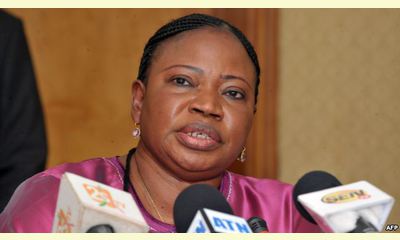|
|
ICC Prosecutor Hails Shift in Fight Against Sexual Violence
un articulo por Nancy Palus, Voice of America News
The chief prosecutor of the International Criminal Court says governments and civil society are showing increased commitment to fighting sexual crimes and other violence against women. ICC Prosecutor Fatou Bensouda spoke to reporters in the Senegalese capital, Dakar, at the opening of a five-day conference on women in the legal sector.

International Criminal Court chief prosecutor Fatou Bensouda gives a press conference in Dakar, November 12, 2012
click on photo to enlarge
ICC Prosecutor Fatou Bensouda, who was in Dakar for a conference of the International Federation of Women in Legal Careers - an organization aimed at protecting the rights of women worldwide - said she is hearing communities speak more and more openly about sexual violence against women, and seeing an increased commitment by governments and civil society to tackling such crimes. She said it is all part of an evolution in how the world regards sexual violence.
"I do believe that states are getting more and more committed to addressing the sexual and gender crimes that take place," Bensouda said. "This is what we need to see, to ensure that we address these crimes, because unless we do that it will always be taken for granted that they should not be addressed."
The International Criminal Court, which marks its 10-year anniversary this week, has 15 cases on its docket.
Bensouda noted to delegates at the conference in Dakar that of these 15 cases, 11 concern sexual violence charges, one sign, she said, of how far international criminal law has evolved in giving sexual crimes the attention they warrant. In the 1990s rape was classed as an instrument of genocide. And the Special Court for Sierra Leone has called forced marriage a crime against humanity.
All 15 of the cases currently on the ICC’s docket concern alleged crimes in Africa. Responding to a reporter’s question of whether the ICC is unfairly “targeting” Africa, Bensouda called for a shift in focus from perpetrators to victims - who are also Africans.
"ICC is working with the victims of these crimes," she said. "We are also working for the victims of these crimes. They are African victims. And they deserve justice. And they deserve a voice. ICC’s intervention in Africa is largely as a result of Africa coming towards the ICC and requesting the ICC to come and address these crimes. I think that we have to readjust our thinking and start thinking of the victims of these crimes. They deserve justice. They deserve peace. They can have both" . . .
|








|
DISCUSSION
Pregunta(s) relacionada(s) al artículo :
Protecting women and girls against violence, Is progress being made?
* * * * *
Comentario más reciente:
:
The 47 CPNN articles devoted to this theme suggest that indeed progress is being made.

|
|









